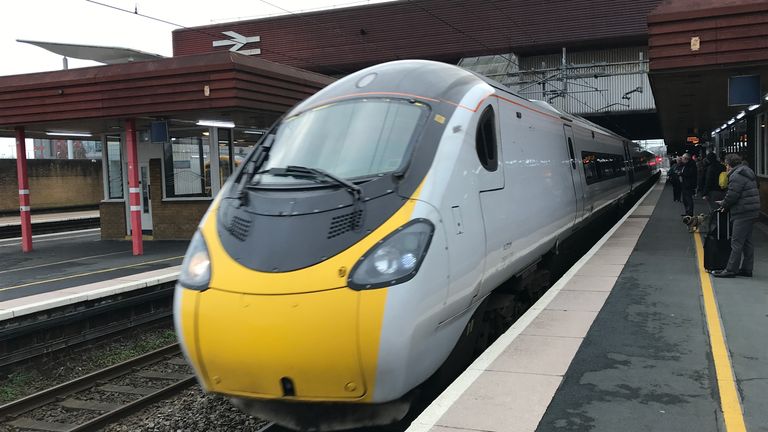Train services across England are being cut as a result of rail staff being forced to self-isolate.
Reduced timetables are being introduced by operators in a bid to improve reliability after a series of last-minute cancellations.
More than 600,000 people in England and Wales were told to quarantine by the NHS coronavirus app in the week to 14 July.
Latest coronavirus updates from the UK and around the world
Workers from 16 sectors could be exempt from isolation
The Department for Transport (DfT) said it had agreed to firms scaling back services in the face of workforce shortages.
AdvertisementIt came as the government launched emergency measures to tackle the so-called “pingdemic”.
While primarily aimed at safeguarding food supplies, a limited number of named people in other industries such as transport, will also be able to avoid the need to self-isolate if identified as a contact of a coronavirus case.
More from Politics COVID-19: New details revealed on which workers may be exempt from isolation rules COVID-19: Self-isolation exemption for food supply chain staff will not be extended to other businesses, says minister COVID-19: UK economic rebound slows sharply as pingdemic takes toll Home Secretary Priti Patel under pressure as police pay freeze branded ‘insult’ by chief constable COVID-19: ‘Summer of closures’ for hotels and restaurants left off ‘pingdemic’ exemption list ‘Real prospect’ the Omagh bombing could have been prevented, judge rulesHowever, they must be fully vaccinated and take daily COVID-19 tests.
The government has also made clear it “is not a blanket exemption for all workers in a sector”, and will be limited to essential posts, such as rail signallers.
Thameslink and Southern will cut its weekday timetables on five routes from Monday “until further notice”.
It warned that further changes could be required, including at weekends.
Image: Hundreds of thousands of people have been ‘pinged’ by the appSteve White, chief operating officer at parent company Govia Thameslink Railway, said: “Regrettably, we have had to make the difficult decision to reduce some weekday services.
“Unfortunately, like other industries across the country, coronavirus continues to affect our operations.
“We have fewer colleagues available at the moment due to a significant increase recently in the number of our people affected by COVID-19.
“Our colleagues have continued to work tirelessly throughout the pandemic and we’re really sorry for any inconvenience caused by the latest changes.
“By bringing in a reduced timetable now, it will help to reduce short-notice cancellations and give customers more certainty.
“We strongly advise passengers to check before they travel, including at weekends.”
Avanti West Coast is also cutting trains from Monday on its routes between London Euston and Manchester, Birmingham and North Wales.
A spokesman said this is to “manage staff shortages and ensure a reliable service”.
London Northwestern Railway will introduce a revised timetable with fewer services from Saturday.
The firm’s customer experience director Lawrence Bowman said: “No-one wants to see trains being cancelled, particularly at short notice.
“But we are experiencing more of this, across all our services, as increasing numbers of staff are getting pinged by the test and trace app.
“We are sorry that we have had to make the decision to alter some services.
“However, the changes will help us run a more reliable and consistent timetable for passengers across our network.”
Business frustration at ‘pingdemic’
Northern said it is “expecting disruption” this weekend due to “more people being asked to self-isolate”.
Routes in and out of Sheffield are likely to be the worst hit.
The operator said: “Our teams work really hard to find cover for services, however we find it more difficult to find cover for isolating colleagues over the weekends.”
A DfT spokesperson said: “We recognise the challenges operators are facing due to staff shortages and have agreed that they can consider a reduced or revised timetable in the event of serious shortages.
“These timetables must prioritise safe and reliable services, and we urge passengers to check before they travel.”
